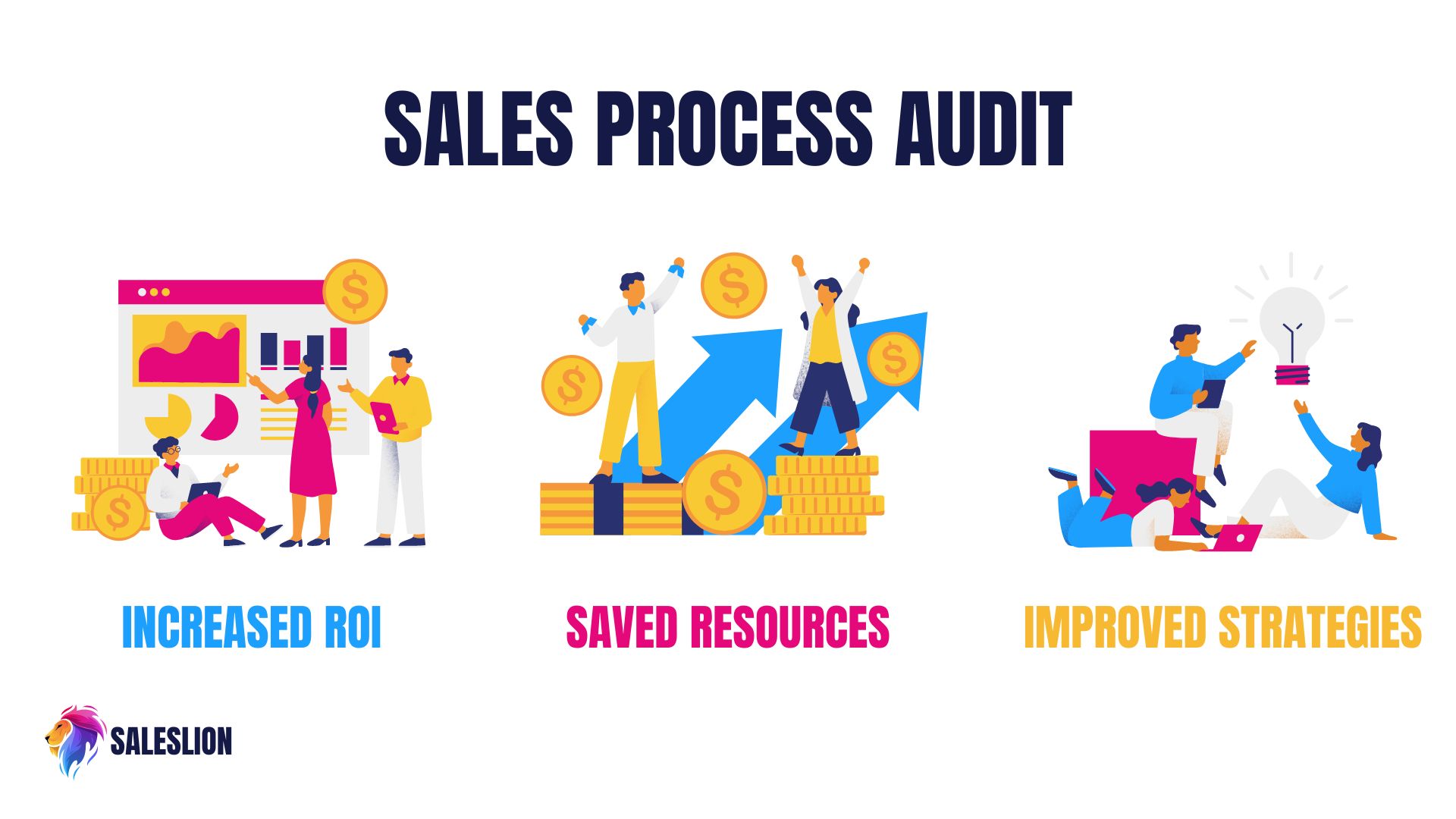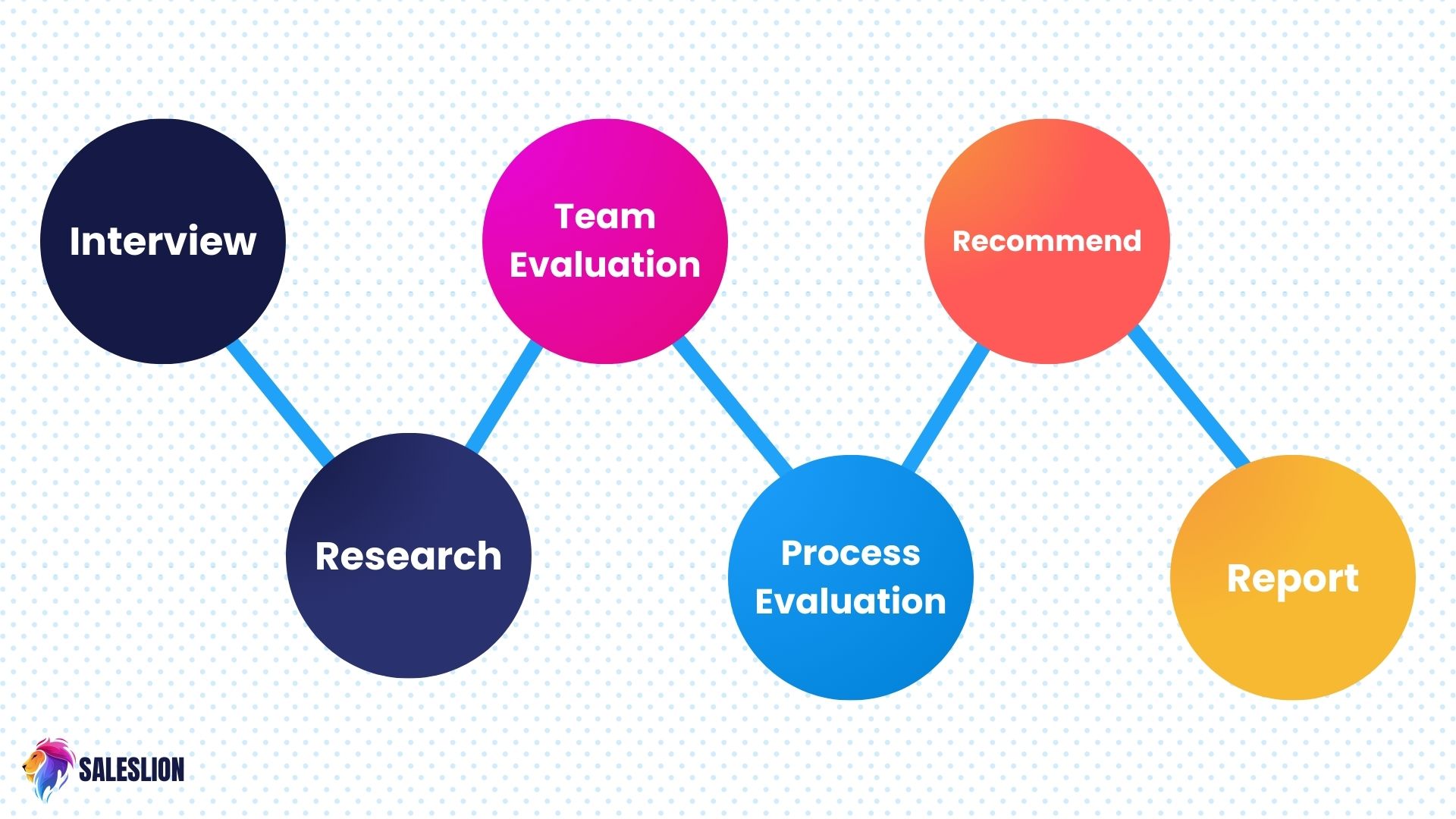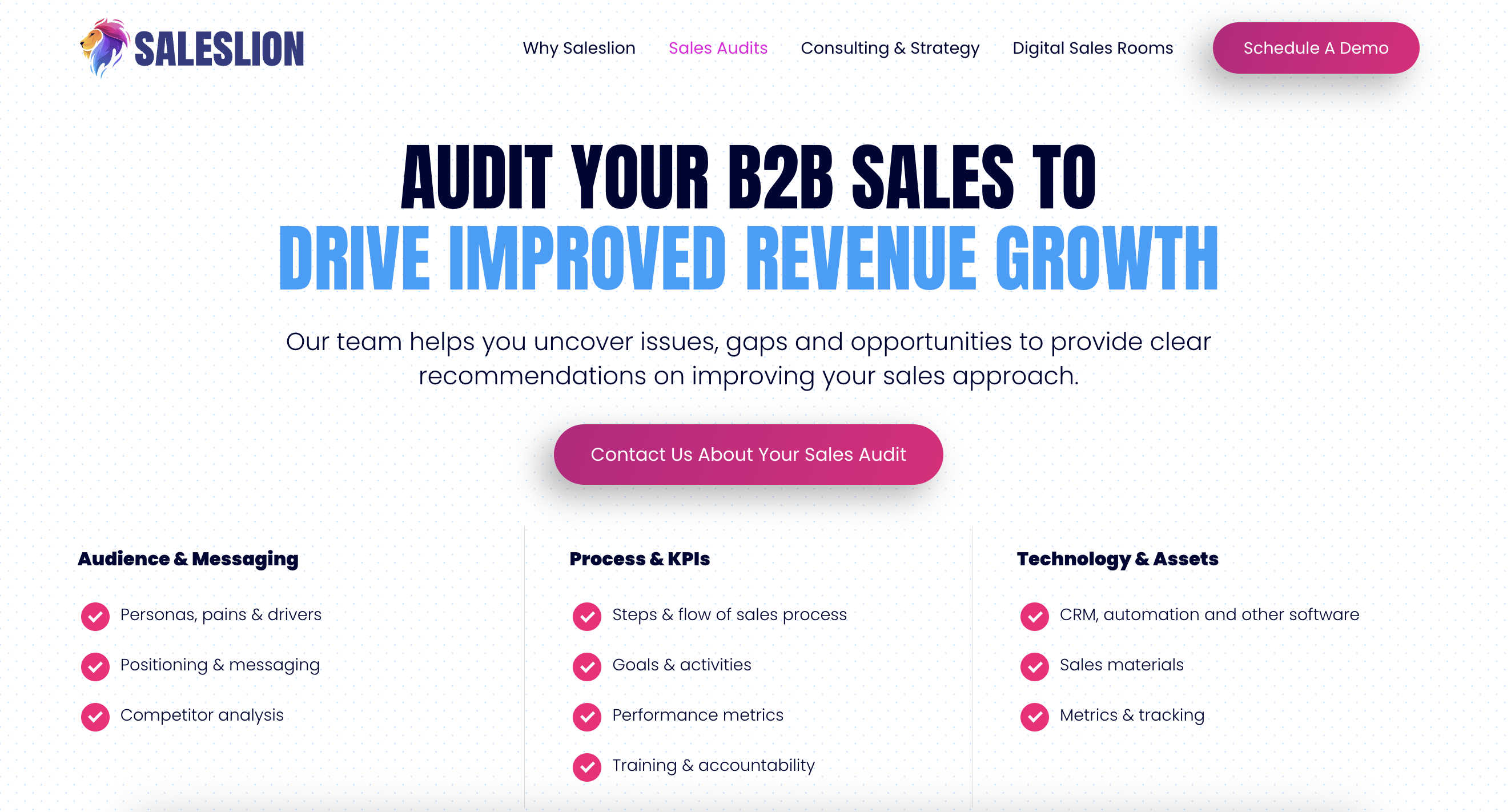Sales process optimization is the process of identifying weak spots in your current systems and making necessary improvements
Optimizing your sales process can involve many things, from ensuring that your solution is easily understood to leveraging technology. But whatever the case, it is obvious that optimization is a crucial part of succeeding as a company.
One of the best ways to begin that optimization process is by taking a sales audit of your current processes. And today we are going to be exploring why exactly you and your sales team need a sales process audit.
In this article…
- The Purpose of Audits
- The Value of Knowing What’s Wrong
- Driving Results with Sales Audits
- Components of a Sales Audit
- Implementation of a Sales Audit
- Why You Should Audit Your Sales Frequently

The Purpose of a Sales Audit
So firstly, what exactly is a sales audit?
A sales audit is an evaluation and analysis of an organization’s sales processes, strategies, and activities.
The aim of sales audits is to identify current constraints and receive feedback on ways to eliminate friction in the sales process.
Furthermore, the results often outline findings, recommendations, and action plans for improving sales performance. And by conducting regular sales audits, B2B companies can optimize sales strategies to drive better results through a frictionless sales process.
Essentially audits are exams for your sales.
Test in School vs Audits in Sales
In school, tests were often viewed as the thing to be avoided at all costs.
They were scary, intimidating, and had the power to dictate our future if we performed poorly.
Some students excelled at tests. Others didn’t.
But all-in-all tests can effectively show us where we are lacking and we can improve.
The same is true for sales audits. As we said before, audits are like exams for your sales.
Sales audits usually involve assessing various aspects of the funnel to identify strengths, weaknesses, and opportunities for improvement.
The purpose of a sales audit is to gain insights into the efficiency of sales efforts and to identify areas to enhance sales performance.
Without tests, students would miss out on valuable opportunities to receive feedback, set new goals, and boost their growth. And without audits, sales teams miss out on the same.
The Value in Knowing What’s Wrong
Okay, now we know that sales audits are used to show sales teams and sales leaders what can be improved in their sales processes.
So what?
Well, there is immense value in knowing what is wrong in your sales process and where you have room for improvement.
Firstly, sales audits can be tremendously valuable because they can point out your blind spots. Maybe there is a stage in your sales process that you initially thought was generating a lot of conversions but after careful analysis, you realize that you are actually losing leads in that phase.
With that information, your team can quickly improve your strategy to boost satisfaction and improve conversion rates.
Another important indicator of the value of sales process audits is that it keeps your company healthy. Without frequent audits, it is easy to start building up a multitude of unresolved issues within your sales systems.
For example, if you were in a boat and it began taking on water, you would want to resolve that issue immediately.
Just like with a leaky boat, leaving the problems in your sales process unresolved for long periods of time can be catastrophic for your company.
Driving Results with a Sales Audit
Sales audits are powerful tools to help you are your team drive results faster and more efficiently.
Whatever you are looking to improve sales process optimization can help you get the most out of your efforts. Sales audits can provide your B2B company with a comprehensive evaluation of your sales processes, strategies, and performance. And by leveraging the insights gained from audits, you can help your company get desired results and scale.

Increased ROI and Conversions
Firstly, as stated before, when your sales leaders take an audit of your current systems, they can better identify where sales reps encounter obstacles or where potential deals get stuck.
This often includes thoroughly examining various stages of the sales funnel, including lead generation, qualification, nurturing, and closing.
With that knowledge, sales teams can adjust their work to streamline the pipeline better, speed up the sales cycle, and eventually increase ROI.
Save Resources
Similarly to improving ROI, audits can also highlight aspects of your processes that are a poor use of resources. These resources can include technology, finances, or even a lack of experience.
By understanding the distribution of resources and assessing their impact on sales performance, you can optimize resource allocation to maximize sales effectiveness.
Improve Sales Strategies
Finally, you can optimize your sales process and drive results by taking a sales audit by improving your sales strategies. By analyzing past performance and assessing the effectiveness of sales techniques, your team can identify areas where systems can be enhanced.
This can involve refining target buyer personas, aligning messaging with customer pain points for optimized personalization, and adopting sales technologies that are more effective in the B2B context.
Sales audits can play a significant role in aligning sales strategies with your company’s overarching objectives so that all energy is directed in a unified direction.
Components of a Sales Audit
While every sales audit looks a little different, they all follow the same general pattern, customer interviews, market research, sales team, and process evaluations, concrete recommendations and improvements, and a finalized report of the findings.

Customer Interviews
Customer interviews involve directly engaging with existing customers to gain insights into their buying journey, satisfaction levels, pain points, and overall experience with the sales process.
These interviews can provide valuable qualitative feedback and help identify areas where your sales process can be improved to better meet customer needs and expectations.
Market Research
Market research involves gathering data and analyzing industry trends, market dynamics, competitor analysis, and customer preferences. It provides a broader perspective on market conditions, customer behavior, and the competitive landscape.
Market research will help your team identify opportunities and challenges that can influence sales performance, enabling your company to make more informed decisions and adapt its sales strategies accordingly.
Sales Team Evaluations
Sales team evaluations involve assessing the performance, skills, and capabilities of individual sales team members as well as the overall team dynamics. This evaluation may include analyzing sales metrics, individual performance reviews, feedback from customers and peers, and observations of sales activities.
Evaluations help identify areas where additional training, coaching, or reorganization may be required to improve your sales team’s effectiveness and performance.
Sales Process Evaluations
The sales process evaluation involves a systematic analysis of the steps and stages involved in converting leads into customers.
It starts from lead generation and qualification, proceeds through the various stages of the sales funnel, and concludes with closing deals and post-sales activities.
The evaluation considers factors such as the efficiency, effectiveness, and consistency of the sales process. It can also include steps such as mapping out the customer journey, assessing sales process steps, and analyzing the effect of the sales process on team members.
Concrete Recommendations
Concrete recommendations and improvements are specific actions and strategies identified based on the findings of the sales audit.
These recommendations address the weaknesses, inefficiencies, or gaps identified in the sales process and provide actionable steps to drive improvement.
They may include suggestions for process optimization, training programs, technology implementation, sales collateral enhancement, or adjustments to sales messaging and positioning.
Finalized Report of Findings
The finalized report of findings is a comprehensive document that consolidates the results and analysis from all components of the sales audit. It provides a detailed overview of the strengths, weaknesses, and opportunities identified during the audit process.
The report often includes a summary, an overview of the methodology used, key findings and insights, an analysis of data and feedback, and recommendations for improvement.
The finalized report should serve as a valuable resource for the key decision-makers in your company to implement changes and track progress over time.
Implementation of a Sales Audit
There are many ways in which you can go about conducting a sales audit for your organization’s sales process.
And while it might be easiest to try to implement an audit of your sales process on your own, having an external review can be beneficial by giving you a fresh perspective and an objective take. Also, as few companies have the internal expertise to implement a successful and quality sales audit on their own teams, outsourcing help is often the best solution.
At Saleslion, our team of experts offers both sales consulting and sales audits to assist B2B companies with their sales process optimization.

The Saleslion sales audit examines three main categories of impact within your sales process, sales teams, and sales reps: audience and messaging, performance and KPIs, and technology and assets. This audit can be used by companies of all sizes looking to optimize their sales.
If you are looking to drive increased revenue growth and you think that your sales process probably has some room for improvement, reach out to us to talk about a sales audit for your company.
Why You Should Audit Your Sales Frequently
Whether with a team like the Saleslion team or on your own, it is vitally important to audit your sales frequently.
In school, frequent tests are productive for students as they can help give them feedback and direction.
The same is true with audits.
The more frequently you take sales audits the better and more effective your performance, strategies, and ability to identify problems will be. Additionally, and also possibly most important, is that when you audit your sales frequently, you will be better able to adapt to any changes in your company or in the market.
Key Takeaways
In conclusion, sales process optimization can play a pivotal role in driving sales success.
By optimizing the sales process by conducting sales audits, your company can enhance efficiency, streamline operations, and increase revenue generation.
Furthermore, through the insights and recommendations that sales audits provide, your sales team will be better equipped to serve customers and adapt to changes in the market.
If you want to learn more about how to optimize your sales with sales audits, reach out to us today!